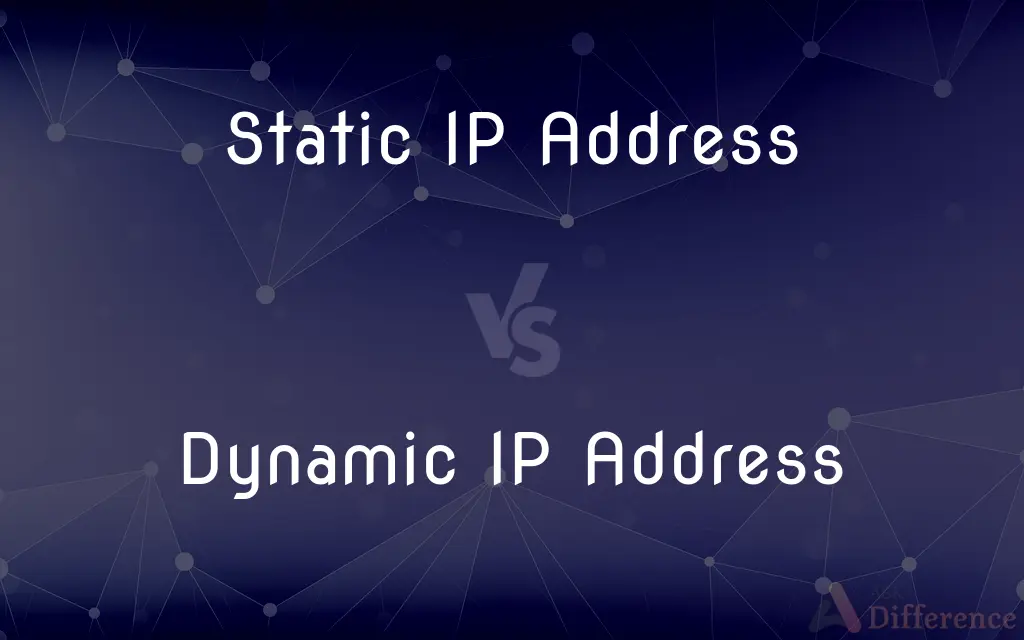Static IP Address vs. Dynamic IP Address — What's the Difference?
By Tayyaba Rehman — Published on January 17, 2024
Static IP Address is a permanent and fixed internet address for a device. Dynamic IP Address is a temporarily assigned IP, changing with each network connection.

Difference Between Static IP Address and Dynamic IP Address
Table of Contents
ADVERTISEMENT
Key Differences
Static IP Address is a constant internet address assigned to a device, remaining unchanged over time. It allows reliable and consistent remote access to the device. Dynamic IP Address is assigned by a network when a device connects and can change each time the device connects to the network. This offers flexibility and efficient IP address management.
In terms of stability, Static IP Addresses provide a stable, unchanging point of contact for devices, making them ideal for servers or devices hosting websites. Dynamic IP Addresses, by contrast, may change frequently, which can disrupt direct remote access but is suitable for consumer devices that don't require constant direct access.
For security, Static IP Addresses can be more vulnerable to hacking attempts, as the address remains the same. Dynamic IP Addresses offer more security through their changing nature, making it harder for unwanted access. However, this can complicate certain network configurations.
From a management perspective, Static IP Addresses require manual configuration and are limited in number, which can lead to shortages. Dynamic IP Addresses are managed automatically by the DHCP (Dynamic Host Configuration Protocol), making them easier to administer for large networks.
Static IP Addresses are typically used in business environments where external access to specific devices is necessary. Dynamic IP Addresses are common in residential and small business settings, where a constantly assigned IP address is not essential.
ADVERTISEMENT
Comparison Chart
Assignment
Permanent and manually assigned
Temporarily assigned by DHCP
Use Case
Ideal for servers, hosting
Common for consumer devices
Network Management
Requires manual configuration
Automatically managed
Security
Potentially more vulnerable
More secure due to changing nature
Stability
Remains the same, allowing consistent access
Changes, can disrupt direct access
Compare with Definitions
Static IP Address
Manually configured and does not change.
The security camera is set up with a static IP address for uninterrupted monitoring.
Dynamic IP Address
Assigned by a network upon each connection.
Each time I reconnect to the Wi-Fi, my laptop gets a new dynamic IP address.
Static IP Address
A permanent internet address for a device.
The company's server uses a static IP address for reliable remote access.
Dynamic IP Address
Automatically managed by the DHCP protocol.
The office network uses DHCP to assign dynamic IP addresses to employees' devices.
Static IP Address
Ideal for hosting websites or servers.
The web server has a static IP address to ensure it is always reachable.
Dynamic IP Address
A temporarily assigned and changeable IP address.
My home router receives a dynamic IP address from the ISP.
Static IP Address
A fixed point of contact on the internet.
Our email server’s static IP address allows for consistent external connections.
Dynamic IP Address
Enhances security through its changing nature.
The changing dynamic IP address adds a layer of security to my internet connection.
Static IP Address
Remains constant for consistent network identification.
Our remote access system requires a static IP address for each device.
Dynamic IP Address
Offers efficient IP address utilization.
Dynamic IP addresses help manage the limited number of available IP addresses.
Common Curiosities
What is a static IP address?
A static IP address is a permanent, unchanging internet address assigned to a device.
What is a dynamic IP address?
A dynamic IP address is temporarily assigned to a device each time it connects to a network.
How is a dynamic IP address assigned?
Dynamic IP addresses are automatically assigned by a network's DHCP server.
Are static IP addresses suitable for home use?
Typically, dynamic IP addresses are sufficient for home use, while static IPs are more business-oriented.
Can a static IP address improve remote access?
Yes, a static IP address provides stable and reliable remote access to devices.
Are dynamic IP addresses more secure?
Yes, the changing nature of dynamic IP addresses offers enhanced security against hacking.
Is a static IP address good for a VPN?
Yes, a static IP address can be beneficial for VPNs due to its consistency.
Can you switch from a static to a dynamic IP address?
Yes, switching between static and dynamic IP addresses is possible depending on network setup and ISP.
Why use a static IP address?
Static IP addresses are used for consistent remote access, hosting servers, or devices requiring stable connectivity.
Can a dynamic IP address change frequently?
Yes, dynamic IP addresses can change each time a device connects to a network.
Do static IP addresses cost more?
Often, ISPs charge extra for static IP addresses due to their limited number and management.
Why are dynamic IP addresses common in residential settings?
They are cost-effective and efficiently manage the limited pool of IP addresses.
Is manual configuration needed for static IP addresses?
Yes, static IP addresses require manual configuration.
Can a static IP address improve gaming experience?
A static IP address can provide a more stable connection for online gaming.
How does DHCP affect dynamic IP addresses?
DHCP automates the management and assignment of dynamic IP addresses.
Share Your Discovery

Previous Comparison
Food Chain vs. Food Web
Next Comparison
Tropic of Cancer vs. Tropic of CapricornAuthor Spotlight
Written by
Tayyaba RehmanTayyaba Rehman is a distinguished writer, currently serving as a primary contributor to askdifference.com. As a researcher in semantics and etymology, Tayyaba's passion for the complexity of languages and their distinctions has found a perfect home on the platform. Tayyaba delves into the intricacies of language, distinguishing between commonly confused words and phrases, thereby providing clarity for readers worldwide.












































